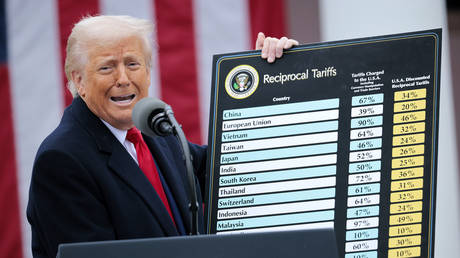
Demonstrators chanted “Stop the boats” while marching in the port town of Dover
Dozens of demonstrators have held a rally in the British port town of Dover, demanding tighter controls on migration and criticizing the government’s asylum system.
The event – the ‘Great British National Protest’ – was held on Saturday, and drew large crowds on the Kent coastline. Many carried Union Jack and England flags as they gathered on the beach and embankment before marching through the town center.
Demonstrators held placards reading “Asylum frauds out” and “Not racist, not far-right, not being listened to!” while chanting “Stop the boats” as they moved along the seafront. One person carried a sign reading: “There is no far right, there is no far left, there are only those who fight against the system.”
One video shows a woman performing a rap that criticized UK Prime Minister Keir Starmer, who many accuse of enabling unchecked migration with his policies.
Video clips and livestreams posted on social media show the protest unfolding peacefully. No counter-demonstrations were reported in the area.
READ MORE: French police entering the sea with knives to tackle illegal migration
A Kent Police spokesman said law enforcement took measures “to ensure the protest remains peaceful, lawful and that disruption to the local area is kept to a minimum. Officers will be monitoring the situation and sufficient resources will be in place to deliver a proportionate police response.”
Dover has long served as a focal point for irregular migration to the UK, with many crossing the English Channel in small, flimsy boats. According to the Migration Observatory, around 37,000 people were detected crossing the English Channel in small boats in 2024, 25% more than the year before, with the number of arrivals increasing further in the first half of 2025.
Over the past six years, citizens of Iran, Afghanistan, Iraq, Albania, Syria, and Eritrea have made up 70% of people crossing in small boats to the UK.
Anti-migrant sentiments in the UK have been on the rise, with many linking migration with surging crime rates. According to government data, there were around 50,500 offences involving a sharp instrument in the year ending March 2024 across England and Wales, excluding Greater Manchester.




